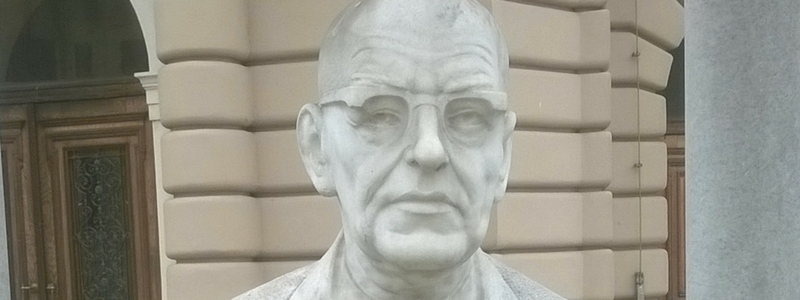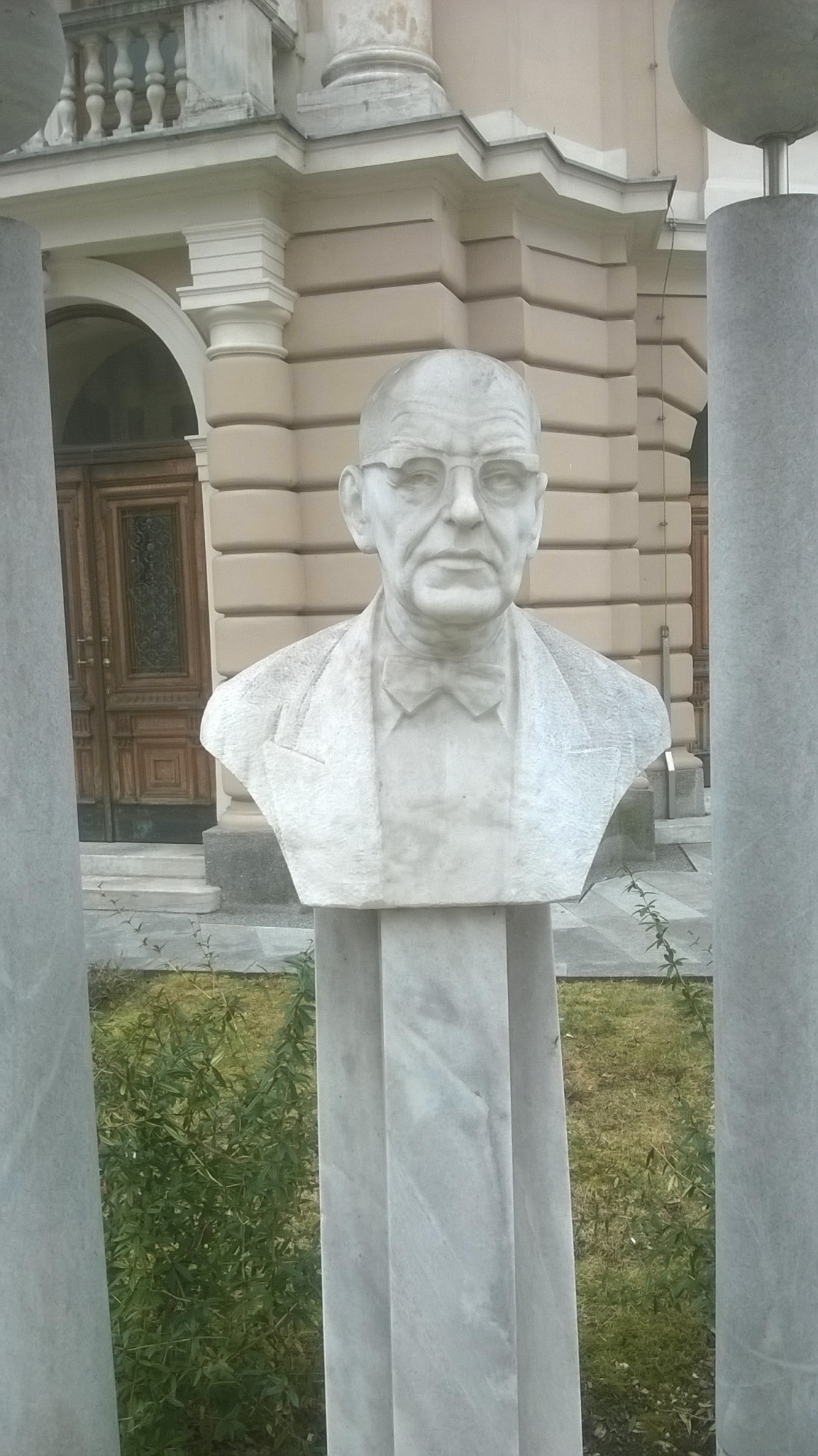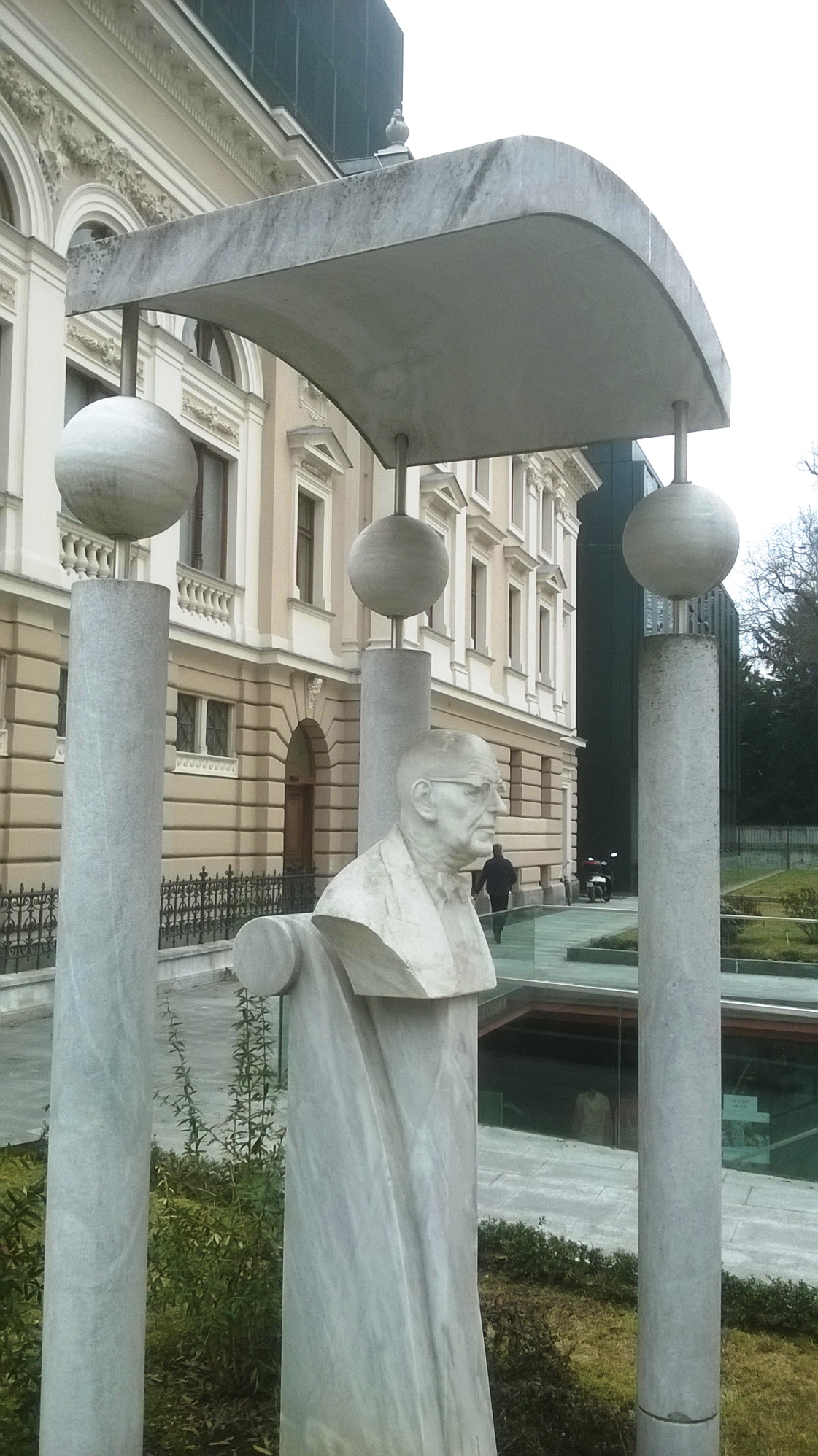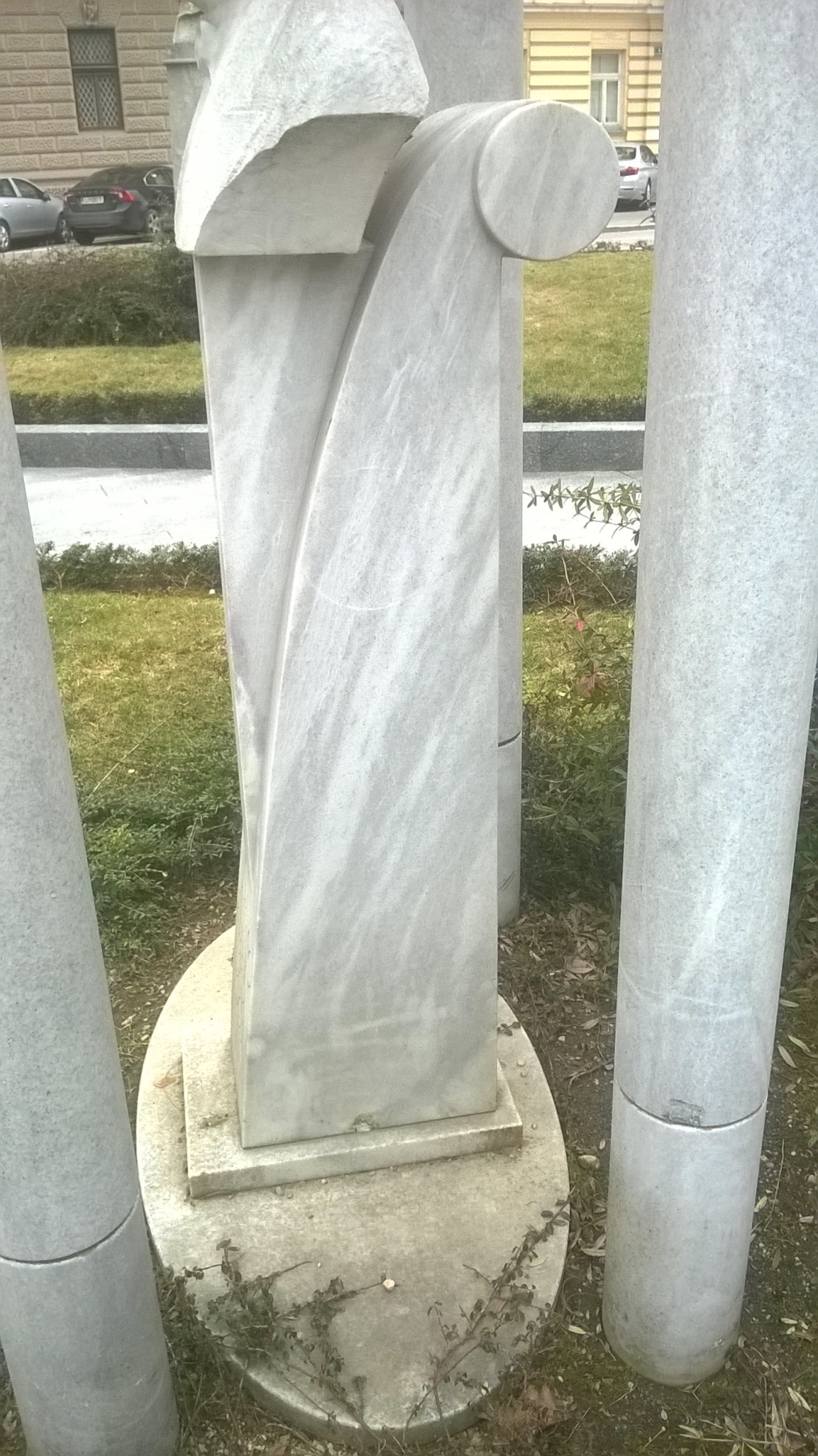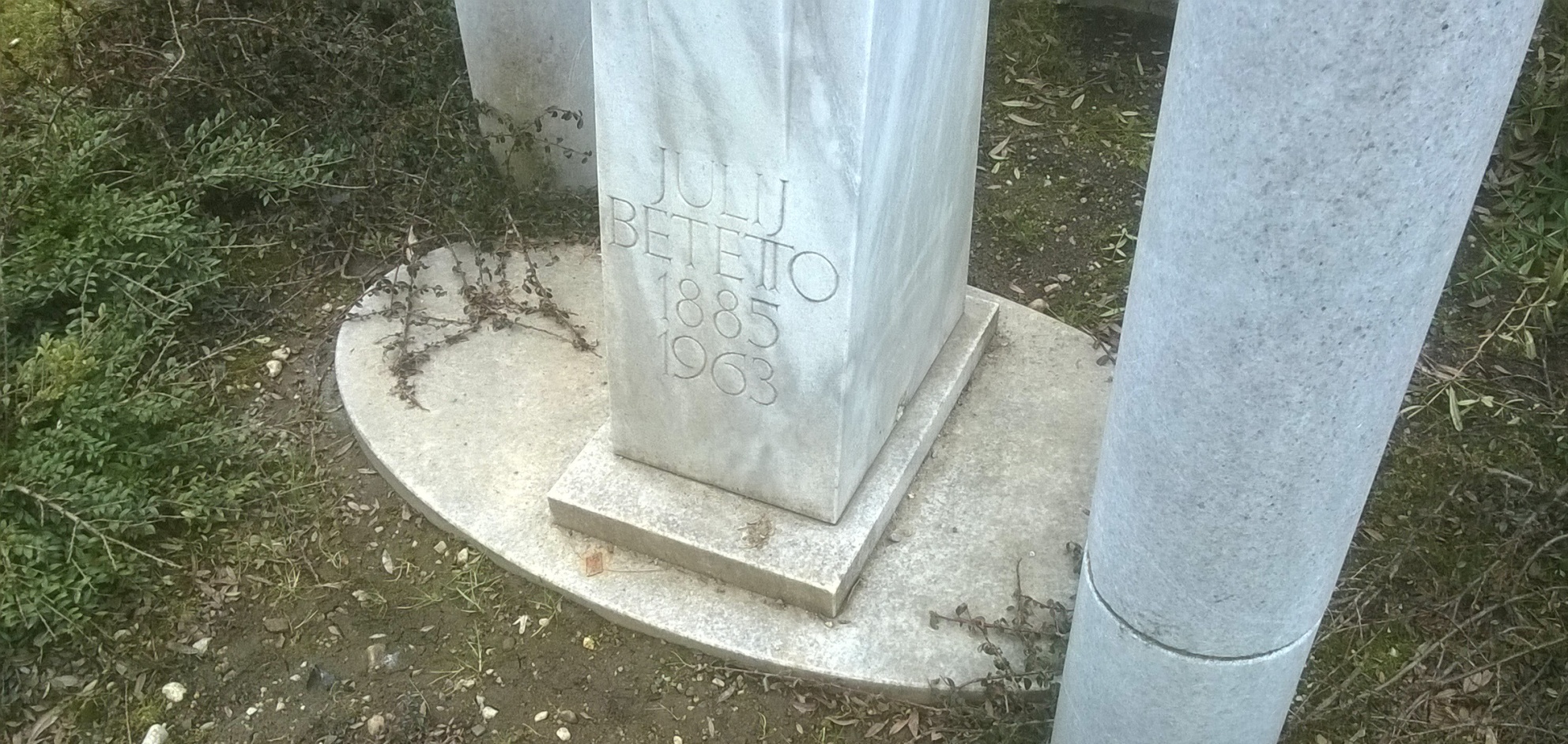In 1990, a monument to Julij Betetto, designed by architect Marko Mušič and made by sculptors Stojan Batič and Julijan Renko (Renko carved the stone version of Batič’s bronze cast), was erected in front of Ljubljana Opera House. The stone bust of the singer and signing teacher was mounted on a tall plinth, surrounded by three stone columns supporting the canopy-like roof. Standing in front of the Opera’s north façade, the memorial was constructed in accordance with the plan to honour the memory of various Slovenian artists by gradually erecting monuments alongside the two lateral facades, thus complementing the existing statues of actors Ignacij Borštnik and Anton Verovšek. Boasting an unusual design, the monument’s convex stone roof, echoing the arch motifs of the Opera’s façade, creates an impression of being suspended in air. The portrait’s decorative plinth, carved by Boris Udovič, represents an instrument (a harp).
Julij Betetto
Hugely influential in shaping Slovenian operatic culture with his pedagogical endeavours and distinguished international career, opera singer Julij Betetto (1885–1963) earned a place in the pantheon of this musical art. Recognised in Slovenia as the doyen of concert and opera singers, the vocalist asserted himself with his exceptional lyric bass (basso cantante) at the Vienna Court Opera and the Bavarian State Opera in Munich, where his formidable reputation grew to lofty heights of fame.
As a secondary school student, Betetto took signing lessons from Fran Gerbič and Matej Hubad. In 1903, he debuted at the age of eighteen at the Provincial Theatre in the role of Mícha in Smetana’s The Bartered Bride, and thus joined the Ljubljana Opera House ensemble. Throughout his career, Betetto interpreted a number of major operatic roles at the Ljubljana Opera, most notably Henry the Fowler in Wagner’s Lohengrin, Mephistopheles in Gounod’s Faust, Caspar in Weber’s Der Freischütz and Kecal in The Bartered Bride.
Between 1907 and 1909, he studied in Vienna, and won an engagement with one of the world’s leading opera institutions, the Court Opera. It was already at the outset of his artistic career that he excelled as a soloist. His remarkable performance in Mozart’s Requiem under the baton of Matej Hubad and with the Glasbena matica Music Society Choir impressed Slovenian critics as well as four members of the Matica Music Society Ljubljana, who awarded him a scholarship for the Viennese Academy of Music and Performing Arts. In Austria, at the recommendation of theatre director August Stoll and with the approval of Gustav Mahler, who at the time was the director of Court Opera, Betetto was assigned a permanent position at the Vienna Opera, and engaged by the ensemble on a regular basis until 1922.
He was cast in all the major bass roles of the standard repertoire, and inspired the celebrated conductor Felix Weingartner in Mozart’ The Magic Flute. He was showered with praise by both the Viennese and Slovenian critics, who expressed their admiration of his steely, sonorous and penetrating bass, as well as his acting skills, and drew favourable similarities with the great Vilém Heš, the then already deceased Czech operatic bass.
In 1923, at the invitation of Matej Hubad, Betetto returned to Ljubljana to become a signing teacher at the Matica Music Society’s Music School. As the leading authority on vocal studies, he imparted his technical and musical knowledge, under the auspices of the Glasbena matica Society, to a new generation of accomplished vocalists, famous figures of Slovenian music scene, in particular Vekoslav Janko, Valerija Heybal, Ladko Korošec, Mitja Gregorač and Marija Bitenc Samec. After Hubad’s death, Betetto succeeded him as the principal of the Glasbena matica Music School and the State Conservatory of Music.
Betetto had a decisive role in establishing the Academy of Music Ljubljana. Towards the late 1930s, the Yugoslav authorities heeded the countless initiatives and in 1939 endorsed the establishment of the Academy of Music, a venture that reflects great credit on the Ljubljana Conservatory of Music and its principal, Julij Betetto. While towards the late 1930s Betetto’s solo singing syllabuses were incorporated into the entire music education curriculum, he was appointed dean of the newly-founded Academy of Music in 1942. After the war and until his retirement, Betetto was the head of the Academy’s solo singing department. Furthermore, he attended to the affirmation and running of his vocal school, although its principles were never systematised to the point of being published in a printed version as a teaching resource. Betetto’s methodology, whose sources of inspiration were his Viennese professors, was primarily modelled after the Thuiskon Hauptner school of singing. The outstanding successes of Betetto’s students who distinguished themselves as mature, established artists and teachers testify to this committed educator’s pivotal role in bringing the Slovenian music education system on a par with European standards.
The Slovenian Music Artists’ Association acknowledges Betetto’s greatness by annually bestowing the Betetto Award for the finest achievements in music.
Maia Juvanc
